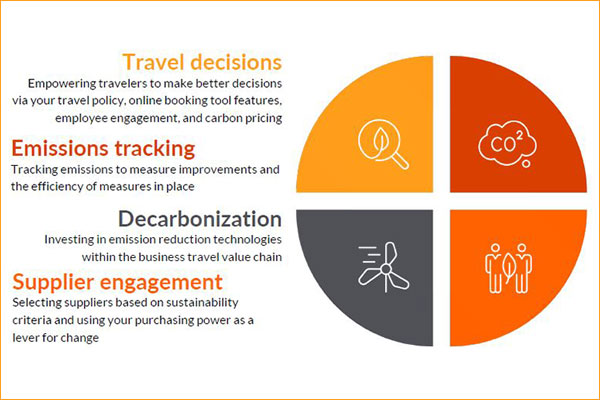Taking Care Of Climate Change

Many companies are implementing various strategies to decarbonize their employee travel as they work to reduce their carbon footprint, however, that raises the question of which practices are effective in driving change and ultimately empowering organizations to continue leveraging business travel while reducing their climate impact?
“Managing Emissions From Business Travel Programs: Overview of Corporate Best Practices” is a new study that sheds light on the approaches that leading companies are using to decarbonize their travel programs.
This first-of-its-kind report from the GBTA Foundation provides a valuable snapshot from purpose-driven companies who are addressing and mitigating their business travel emissions. Released during Earth Month, the study examines which measures are most effective in reducing the climate impact of Scope 3 emissions from business travel and key considerations for implementation and success.
Delphine Millot, Managing Director, GBTA Foundation, said that: “One of the biggest challenges for achieving more sustainable business travel is knowing how to build the path and the program to get there. We went to companies and leaders in sustainability to bring forth best practices and insights that can help any company seeking to travel greener and better.”
Millot added that tackling Scope 3.6 emissions needs to be a joint effort across the entire global business travel value chain and relies on common ownership and shared responsibility between the suppliers and users of travel services.
Alexandru Dinca, Global Sustainability Lead, Unilever, and GBTA Foundation CAB member, pointed out that: “Corporate travel managers are uniquely placed to enable their companies to effectively reduce emissions from business travel because they understand the mechanisms better than anyone. I am hopeful this new report, which includes the collective insights of GBTA’s Corporate Advisory Board members, will support business travel professionals in their climate journey.”
The report lays out a pathway of building blocks for companies to create a more climate-conscious travel program – from getting started with measures requiring less effort and funding, to advancing with more ambitious strategies, activities, and outcomes.
Developing a sustainable travel program involves a combination of measures at different levels and working with various stakeholders. The report outlines measures across four critical categories: travel decisions, emissions tracking, supplier engagement, and decarbonization. Additionally, it provides a toolbox of action areas to efficiently reduce emissions while aligning to organization budgets, available time, company culture, and other factors.
Lowering the impact of business travel on the environment is an iterative process. The report identifies commonalities among interviewees, emphasizing the integral elements necessary to effectively reduce emissions from business travel:
- No One Size Fits All: Evaluate needs and return on investment before drawing from the toolbox.
- Make a Demand Signal: Corporate travel managers have a key role to play in signalling a growing demand for greener travel options.
- Start Today: Strive to improve emissions data, but don’t let perfection halt progress.
- Go “Glocal”: Global strategies should be localized to consider infrastructure and cultural differences.
- Future Proof: Combine quick wins with longer-term investments.
- Collaboration is Key: Sustainability is a shared effort between corporate travel managers, procurement, sustainability, and employee travellers.
Additional topics covered in the report include integrating climate considerations into corporate travel policies, measuring travel program emissions, greening the procurement process, and navigating Sustainable Aviation Fuel (SAF) opportunities toward decarbonizing air travel.
Go to https://gbtafoundation.org/emissions-benchmarking/ for more.


